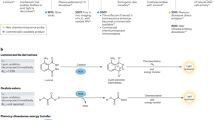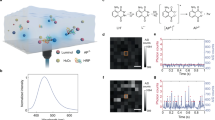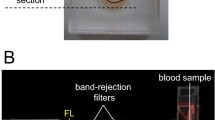Abstract
MOST chemiluminescent reactions are known to involve molecular oxygen or other compounds (peroxides, ozonides) liberating oxygen1. This striking correlation between chemiluminescence and oxidation was first established three centuries ago by Robert Boyle, who performed experiments with shining wood, fish and flesh, and found that their light disappeared on removing the air2. However, no satisfactory theory of the phenomenon has been offered so far.
This is a preview of subscription content, access via your institution
Access options
Subscribe to this journal
Receive 51 print issues and online access
$199.00 per year
only $3.90 per issue
Buy this article
- Purchase on Springer Link
- Instant access to full article PDF
Prices may be subject to local taxes which are calculated during checkout
Similar content being viewed by others
References
Reid, C., Excited States in Chemistry and Biology (London, 1957).
Harvey, E. N., A History of Luminescence (Philadelphia, 1957).
Shlyapintokh, V. Ya, Vassil'ev, R. F., et al., J. Chim. Phys., 1113 (1960).
Vassil'ev, R. F., and Vichutinskii, A. A., Dokl. Akad. Nauk., 142 No. 3; 144, No. 1 (1962).
Bamford, C., and Dewar, M., Proc. Roy. Soc., A, 198, 252 (1949).
Author information
Authors and Affiliations
Rights and permissions
About this article
Cite this article
VASSIL'EV, R., VICHUTINSKII, A. Chemiluminescence and Oxidation. Nature 194, 1276–1277 (1962). https://doi.org/10.1038/1941276a0
Issue Date:
DOI: https://doi.org/10.1038/1941276a0
This article is cited by
-
Generation of fullerenyl radicals and chemiluminescence in the (C60—R3Al)—O2 system
Russian Chemical Bulletin (2007)
-
Ultraweak biophoton emission imaging of transplanted bladder cancer
Urological Research (1995)
-
Rapid estimation of peroxide content of soybean oil by measuring thermoluminescence
Journal of the American Oil Chemists' Society (1994)
Comments
By submitting a comment you agree to abide by our Terms and Community Guidelines. If you find something abusive or that does not comply with our terms or guidelines please flag it as inappropriate.



